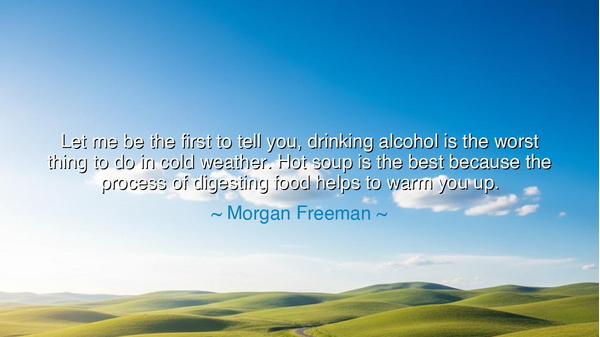
Let me be the first to tell you, drinking alcohol is the worst
Let me be the first to tell you, drinking alcohol is the worst thing to do in cold weather. Hot soup is the best because the process of digesting food helps to warm you up.






Host: The warm glow of the evening light cast a calming atmosphere across the room. Jack sat at the table, his fingers resting lightly on his cup, reflecting on Morgan Freeman’s words. Jeeny stood near the window, her gaze directed outward, considering the deeper meaning behind Freeman's practical advice.
Jeeny: “I’ve been thinking about what Morgan Freeman said: ‘Let me be the first to tell you, drinking alcohol is the worst thing to do in cold weather. Hot soup is the best because the process of digesting food helps to warm you up.’ It’s such a simple, but insightful way to think about how we care for our bodies in different situations, isn’t it? We often turn to alcohol in the cold for warmth, but Freeman is pointing out that it’s actually the digestive process of food, like soup, that really helps us stay warm.”
Jack: “Yes, exactly. Freeman is reminding us that our bodies don’t just need a quick comforting feeling, like alcohol might provide—it needs something that sustains us, something that gives us true warmth and energy. Alcohol might make us feel warm for a moment, but it actually lowers our core body temperature. Soup, on the other hand, has the benefit of nourishing our bodies while keeping us warm from the inside out. It’s more than just a temporary fix; it’s a long-term solution.”
Jeeny: “Exactly. I think it’s also about how we sometimes mistake comfort for what’s actually beneficial for us. We might reach for alcohol in the cold because it feels good in the moment, but Freeman is showing us that what our bodies really need is something that fuels them, something that will nourish and sustain us. It’s about going beyond the immediate gratification and making choices that support our well-being.”
Host: The stillness in the room deepened, as they reflected on how we often make quick, seemingly comforting choices that don’t always serve our long-term health. Jack’s fingers rested on the table, while Jeeny’s expression softened, considering the simple but profound wisdom of choosing what truly helps the body, rather than what just provides temporary relief.
Jack: “It makes me think about how we often look for quick fixes in life—whether it’s with food, or other areas—and how often those fixes don’t really serve us. Freeman is showing us that sometimes the simplest, most nourishing choices are the best ones. The idea of hot soup being better than alcohol in cold weather is a reminder that sometimes, the things we think will help us the most aren’t actually what our bodies need.”
Jeeny: “Exactly. It’s a reminder that sometimes the simple, thoughtful actions we take are the most effective. We don’t always have to reach for something flashy or immediate; sometimes, the best solution is something gentle and sustaining, like hot soup. It’s about understanding that balance and nourishment are key to feeling good in the long run.”
Jack: “And I think this goes beyond just food. It’s about mindful choices in every part of our lives. It’s easy to go for the quick fix, but those quick fixes often don’t address our true needs. When we stop and think about what we truly need to feel good—whether it’s in terms of health, relationships, or personal growth—we start making decisions that actually serve us in a deeper, more lasting way.”
Jeeny: “Yes, and I think it’s also about listening to our bodies. Freeman is essentially telling us to be more aware of what truly warms us, nourishes us, and helps us feel grounded—not just physically, but emotionally too. Whether it’s food or the choices we make in other areas of our lives, it’s about being more mindful and less reactive to what feels good in the moment.”
Host: The quiet in the room grew deeper as they considered how simple, intentional choices—whether it’s food or life decisions—can have a long-lasting, positive impact. Morgan Freeman had reminded them that while quick fixes may offer temporary comfort, it’s the mindful, nourishing choices that truly serve us in the long run. Jack leaned back slightly in his chair, while Jeeny’s gaze turned from the window back to him, both of them understanding the importance of embracing what sustains rather than what just comforts us in the moment.
Jack: “So, Freeman is showing us that the best things for us aren’t always the immediate comforts. Sometimes it’s the nourishing, slower choices—like hot soup in the cold—that help us the most. It’s about thinking long-term, not just about the quick relief.”
Jeeny: “Exactly. It’s about making choices that support our health and well-being, even when it’s not the easiest option. Freeman is reminding us that true warmth and comfort come from the choices we make that nourish us—our bodies, minds, and spirits.”
Host: The evening had fully settled in, the quiet understanding between them a reminder that the best solutions often come from thoughtful, nourishing choices that serve us in the long run. Morgan Freeman had shown them that while quick fixes may feel good in the moment, it’s the intentional choices, like nourishing food, that truly support us. The world outside had darkened, but inside, there was light—a recognition that taking care of ourselves is about more than temporary relief; it’s about long-lasting, sustaining nourishment.






AAdministratorAdministrator
Welcome, honored guests. Please leave a comment, we will respond soon